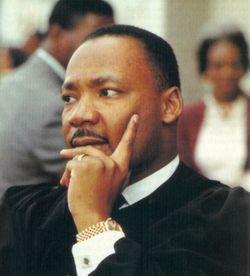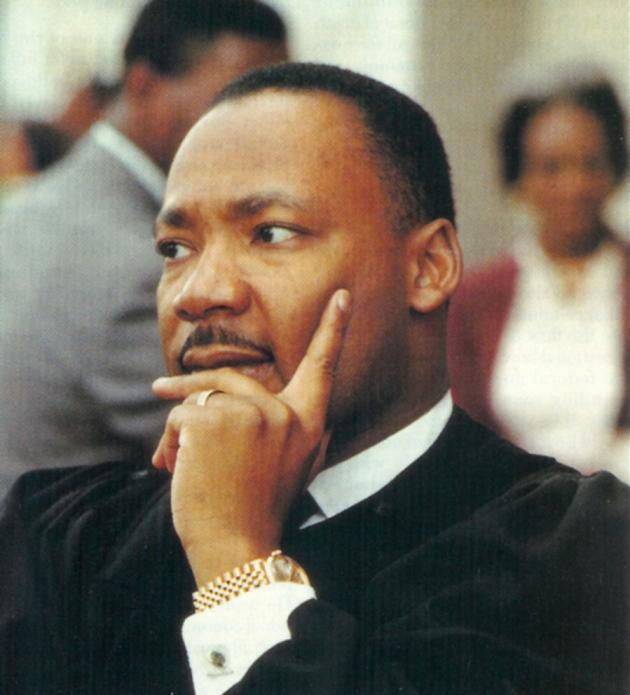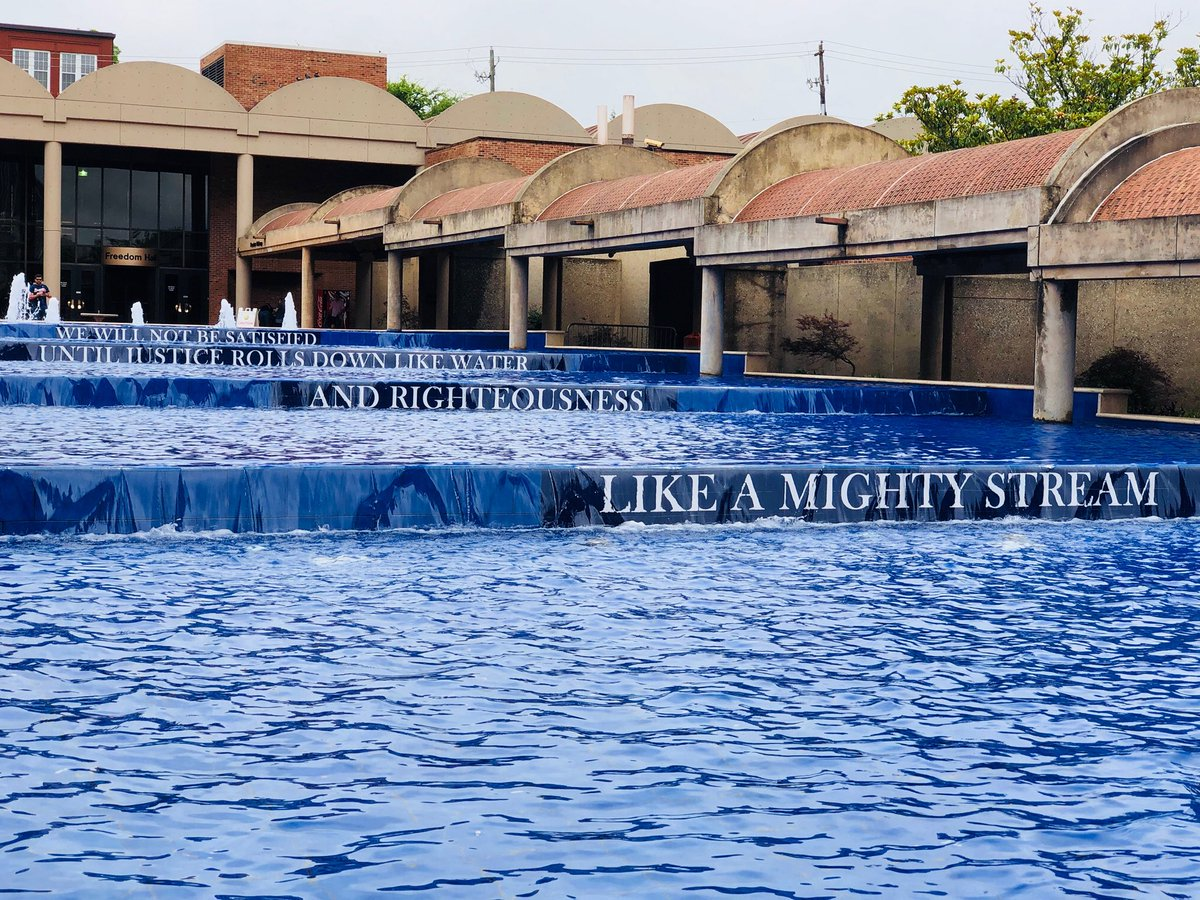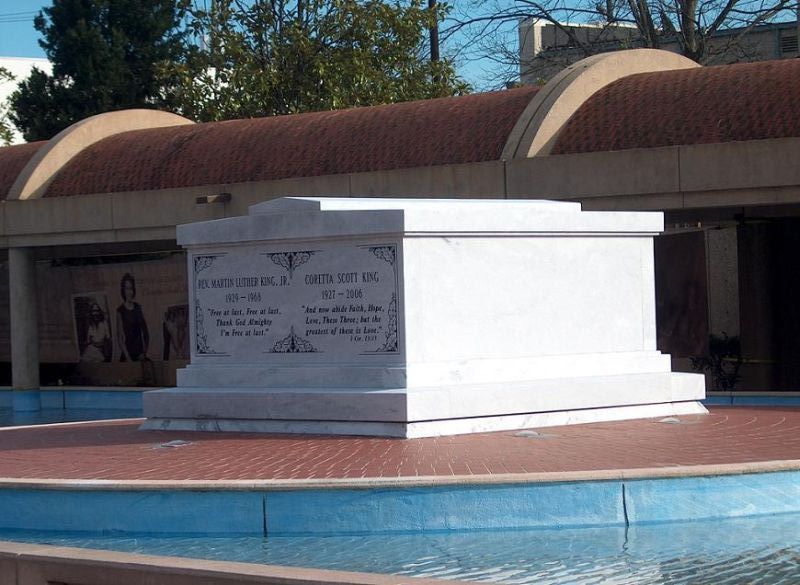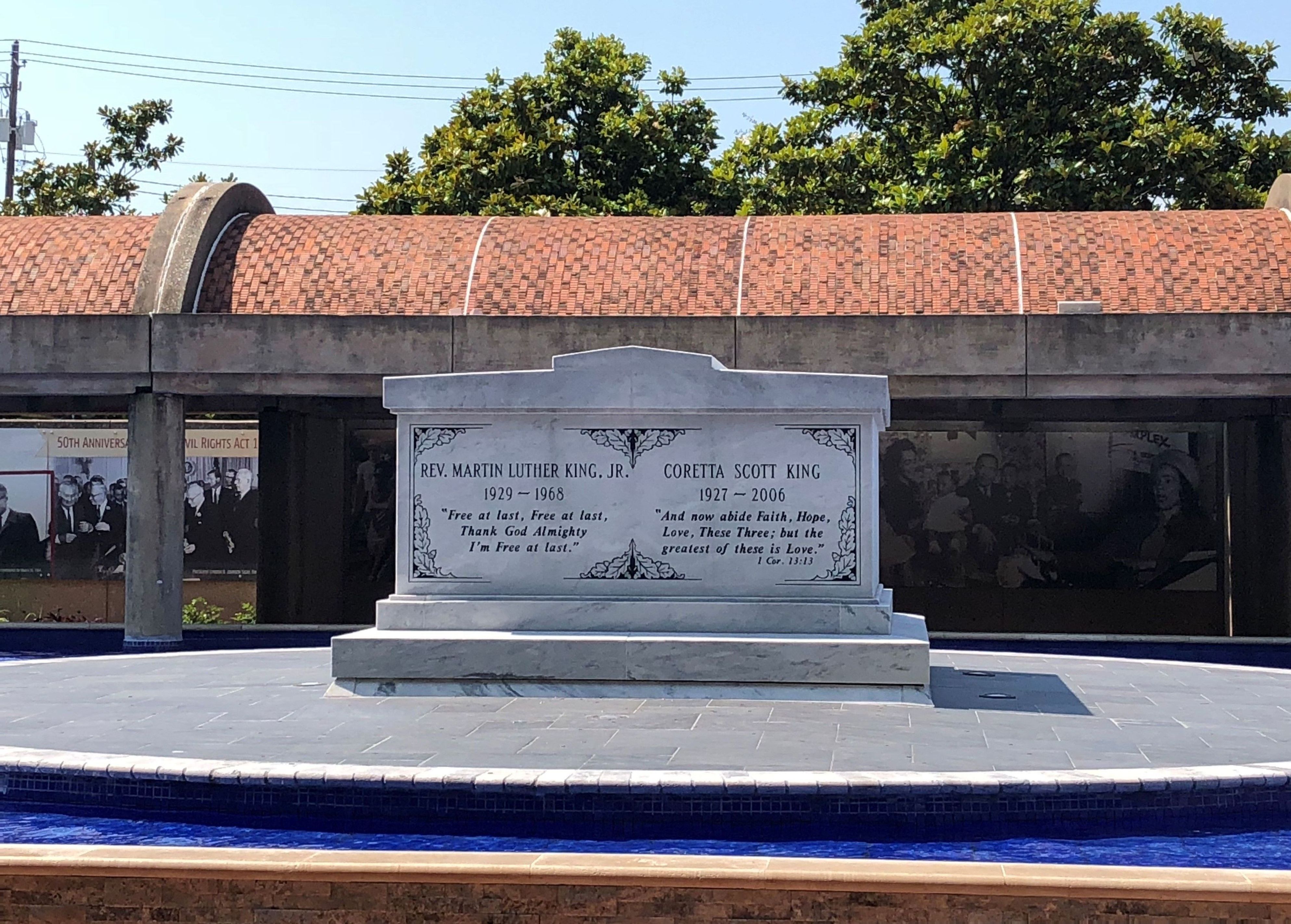Nobel Peace Prize Laureate, Social Reformer. He was the recipient of the 1964 Nobel Peace Prize for his work for racial equality in the United States, President of the Southern Christian Leadership Conference (SCLC), and the most prominent African American leader in the civil rights movement of the 1950s and 1960s. In the eleven-year period between 1957 and 1968, he traveled over six million miles and spoke over twenty-five hundred times, appearing wherever there was injustice, protest, and action; and he authored five books as well as numerous articles. He organized and led marches for the right to vote, desegregation, fair hiring practices, and other basic civil rights. His pleas rallied the support of millions of people, black and white, and made him internationally famous. He is perhaps most famous for his "I Have A Dream" speech, which was given in front of the Lincoln Memorial during the 1963 March on Washington, D.C. King was born the eldest son of Rev. Martin Luther "Daddy King" King, Sr. and Alberta Williams King. With the church and education being the central forces that shaped his early life, he was educated in Atlanta, graduating from Booker T. Washington High School in 1944. Following the path of his maternal grandfather Rev. A.D. Williams and his own father, he enrolled at Morehouse College. At the college, he became an admirer of president Dr. Benjamin E. Mays, who influenced him in entering the ministry. He first considered studying medicine or law, then decided to major in sociology; however ultimately found the call to the ministry irresistible. He served as assistant pastor to his father at Ebenezer Baptist Church while studying at Morehouse College. In February of 1948, he was ordained as a Baptist Minister by his father, which followed with graduating from Morehouse. King studied for a divinity degree at Crozer Theological Seminary in Upland, Pennsylvania, graduating in 1951. The following September, he enrolled at Boston University in the Ph.D. program in Systematic Theology, later earning his doctoral degree. There he met his future wife, Coretta Scott, whom he later married in 1953. The couple had four children. In 1954, he accepted his first pastorate at Dexter Avenue Baptist Church in Montgomery, Alabama. He became active with the National Association for the Advancement of Colored People (NAACP) and the Alabama Council on Human Relations. He was selected to head the Montgomery Improvement Association, whose boycott efforts eventually ended the city's policies of racial segregation on public transportation resulting from the arrest of Rosa Parks. In 1957, he, along with close friend Rev. Ralph D. Abernathy and others, later formed the Southern Christian Leadership Conference (SCLC), an organization of black ministers and churches aimed to challenge racial segregation. The ideals for this organization he took from Christianity and the operational techniques from Gandhi. At the time, widespread segregation existed throughout the South in public schools, transportation, recreation, and such public facilities as hotels and restaurants. Many states also used various methods to deprive African Americans of their voting rights. In 1958, he was stabbed by a mentally-deranged woman while on a book tour in New York City. In 1960, King moved from Montgomery to Atlanta to devote more effort to SCLC's work. He became co-pastor of Ebenezer Baptist Church with his father. Throughout this time period, heavy news coverage of the violence across the United States produced a national outcry against segregation. Under his leadership in the late 1950s and 1960s, civil disobedience and non-violent tactics, like the Washington March of 250,000 people in 1963, brought about major victories with the Civil Rights Act and Voting Rights act in 1965. By the mid-1960's, his role as the leader of the Civil Rights Movement was questioned by many black militants. Continued violence against civil rights workers of the South frustrated many African-American leaders. Some urged a more aggressive response to the continuing violence and began to use the slogan "Black Power." King repeated his commitment to nonviolence, but disputes among civil rights groups over "Black Power" suggested that he no longer spoke for the movement. In 1966, he extended his campaign to slum conditions in the Northern cities of the U.S. such as Chicago and later establishing the Poor People's Campaign in 1968. He was less successful in this area since the Vietnam War distracted national attention from civil rights and urban issues. In 1967, he attacked the U.S. support of South Vietnam in the Vietnam War (1957-1975) which was denounced by supporters of the war. While organizing the Poor People's Campaign, he went to Memphis, Tennessee, to support a strike of black garbage men, and while there, was shot and killed by James Earl Ray at the Lorraine Motel at 6:01 in the evening. The night before he was killed, he gave his "I've Been to the Mountaintop" speech at Mason Temple that drew upon the Biblical images of the old slave spirituals, to instill hope and at the same time seemed to anticipate his own death. As a controversial public figure whose was repeatedly praised and vilified, his life had been threatened many times. King himself had said that he did not expect to live a long life. People throughout the world mourned King's death. His assassination produced immediate shock, grief, and anger across the United States. African-Americans rioted in more than 100 cities and on innumerable campuses. Several lives were lost resulting in roughly $50 million in damage. His funeral in Atlanta days later was broadcast to the world. Three hundred thousand people gathered around and in Ebenezer Baptist Church. Inside the packed church included many of the country's political leaders, as well as quite a few labor leaders, foreign dignitaries, entertainment and sports figures, and leaders from numerous religious faiths. The United States Congress passed the Voting Right Act of 1965 and the Civil Rights Act of 1968, which prohibited racial discrimination in the sale and rental of most housing in the nation. The same year Coretta Scott King founded the Martin Luther King, Jr. Center of Non-Violent Social Change in Atlanta as a memorial to her husband. The Center seeks to advance King's philosophies of justice and nonviolence through its educational programs, exhibitions, and tours. His remains were later moved to an area which in 1980 became known as the Martin Luther King Jr. National Historic Site, which includes The King Center, his birth home, and Ebenezer Baptist Church. In 1983, Congress passed legislation to make the third Monday in January Martin Luther King Day, a national holiday in honor of King, observed for the first time on January 20, 1986. Since his death, Martin Luther King Jr. has come to represent black courage and achievement, high moral leadership, and the ability of Americans to address and overcome racial divisions. He received numerous honors throughout his life and since his death including being posthumously awarded the Presidential Medal of Freedom by President Jimmy Carter in 1977, the Congressional Gold Medal in 2004, and the Martin Luther King Jr. Memorial on the National Mall in Washington, D.C. Major collections of his papers are now owned by Boston University, the King Center, and Morehouse College. King published five books: "Stride to Freedom" in 1958, "Strength to Love" in 1963, "Why We Can't Wait" in 1964, "Where Do We Go From Here: Chaos or Community?" in 1967, and "The Trumpet of Conscience" in 1968. King County, Washington, home of Seattle, was renamed in King's honor in 2005. Above the west door, his statue is one of the ten on exhibit at the Gallery of 20th Century Martyrs at Westminster Abbey in London.
Nobel Peace Prize Laureate, Social Reformer. He was the recipient of the 1964 Nobel Peace Prize for his work for racial equality in the United States, President of the Southern Christian Leadership Conference (SCLC), and the most prominent African American leader in the civil rights movement of the 1950s and 1960s. In the eleven-year period between 1957 and 1968, he traveled over six million miles and spoke over twenty-five hundred times, appearing wherever there was injustice, protest, and action; and he authored five books as well as numerous articles. He organized and led marches for the right to vote, desegregation, fair hiring practices, and other basic civil rights. His pleas rallied the support of millions of people, black and white, and made him internationally famous. He is perhaps most famous for his "I Have A Dream" speech, which was given in front of the Lincoln Memorial during the 1963 March on Washington, D.C. King was born the eldest son of Rev. Martin Luther "Daddy King" King, Sr. and Alberta Williams King. With the church and education being the central forces that shaped his early life, he was educated in Atlanta, graduating from Booker T. Washington High School in 1944. Following the path of his maternal grandfather Rev. A.D. Williams and his own father, he enrolled at Morehouse College. At the college, he became an admirer of president Dr. Benjamin E. Mays, who influenced him in entering the ministry. He first considered studying medicine or law, then decided to major in sociology; however ultimately found the call to the ministry irresistible. He served as assistant pastor to his father at Ebenezer Baptist Church while studying at Morehouse College. In February of 1948, he was ordained as a Baptist Minister by his father, which followed with graduating from Morehouse. King studied for a divinity degree at Crozer Theological Seminary in Upland, Pennsylvania, graduating in 1951. The following September, he enrolled at Boston University in the Ph.D. program in Systematic Theology, later earning his doctoral degree. There he met his future wife, Coretta Scott, whom he later married in 1953. The couple had four children. In 1954, he accepted his first pastorate at Dexter Avenue Baptist Church in Montgomery, Alabama. He became active with the National Association for the Advancement of Colored People (NAACP) and the Alabama Council on Human Relations. He was selected to head the Montgomery Improvement Association, whose boycott efforts eventually ended the city's policies of racial segregation on public transportation resulting from the arrest of Rosa Parks. In 1957, he, along with close friend Rev. Ralph D. Abernathy and others, later formed the Southern Christian Leadership Conference (SCLC), an organization of black ministers and churches aimed to challenge racial segregation. The ideals for this organization he took from Christianity and the operational techniques from Gandhi. At the time, widespread segregation existed throughout the South in public schools, transportation, recreation, and such public facilities as hotels and restaurants. Many states also used various methods to deprive African Americans of their voting rights. In 1958, he was stabbed by a mentally-deranged woman while on a book tour in New York City. In 1960, King moved from Montgomery to Atlanta to devote more effort to SCLC's work. He became co-pastor of Ebenezer Baptist Church with his father. Throughout this time period, heavy news coverage of the violence across the United States produced a national outcry against segregation. Under his leadership in the late 1950s and 1960s, civil disobedience and non-violent tactics, like the Washington March of 250,000 people in 1963, brought about major victories with the Civil Rights Act and Voting Rights act in 1965. By the mid-1960's, his role as the leader of the Civil Rights Movement was questioned by many black militants. Continued violence against civil rights workers of the South frustrated many African-American leaders. Some urged a more aggressive response to the continuing violence and began to use the slogan "Black Power." King repeated his commitment to nonviolence, but disputes among civil rights groups over "Black Power" suggested that he no longer spoke for the movement. In 1966, he extended his campaign to slum conditions in the Northern cities of the U.S. such as Chicago and later establishing the Poor People's Campaign in 1968. He was less successful in this area since the Vietnam War distracted national attention from civil rights and urban issues. In 1967, he attacked the U.S. support of South Vietnam in the Vietnam War (1957-1975) which was denounced by supporters of the war. While organizing the Poor People's Campaign, he went to Memphis, Tennessee, to support a strike of black garbage men, and while there, was shot and killed by James Earl Ray at the Lorraine Motel at 6:01 in the evening. The night before he was killed, he gave his "I've Been to the Mountaintop" speech at Mason Temple that drew upon the Biblical images of the old slave spirituals, to instill hope and at the same time seemed to anticipate his own death. As a controversial public figure whose was repeatedly praised and vilified, his life had been threatened many times. King himself had said that he did not expect to live a long life. People throughout the world mourned King's death. His assassination produced immediate shock, grief, and anger across the United States. African-Americans rioted in more than 100 cities and on innumerable campuses. Several lives were lost resulting in roughly $50 million in damage. His funeral in Atlanta days later was broadcast to the world. Three hundred thousand people gathered around and in Ebenezer Baptist Church. Inside the packed church included many of the country's political leaders, as well as quite a few labor leaders, foreign dignitaries, entertainment and sports figures, and leaders from numerous religious faiths. The United States Congress passed the Voting Right Act of 1965 and the Civil Rights Act of 1968, which prohibited racial discrimination in the sale and rental of most housing in the nation. The same year Coretta Scott King founded the Martin Luther King, Jr. Center of Non-Violent Social Change in Atlanta as a memorial to her husband. The Center seeks to advance King's philosophies of justice and nonviolence through its educational programs, exhibitions, and tours. His remains were later moved to an area which in 1980 became known as the Martin Luther King Jr. National Historic Site, which includes The King Center, his birth home, and Ebenezer Baptist Church. In 1983, Congress passed legislation to make the third Monday in January Martin Luther King Day, a national holiday in honor of King, observed for the first time on January 20, 1986. Since his death, Martin Luther King Jr. has come to represent black courage and achievement, high moral leadership, and the ability of Americans to address and overcome racial divisions. He received numerous honors throughout his life and since his death including being posthumously awarded the Presidential Medal of Freedom by President Jimmy Carter in 1977, the Congressional Gold Medal in 2004, and the Martin Luther King Jr. Memorial on the National Mall in Washington, D.C. Major collections of his papers are now owned by Boston University, the King Center, and Morehouse College. King published five books: "Stride to Freedom" in 1958, "Strength to Love" in 1963, "Why We Can't Wait" in 1964, "Where Do We Go From Here: Chaos or Community?" in 1967, and "The Trumpet of Conscience" in 1968. King County, Washington, home of Seattle, was renamed in King's honor in 2005. Above the west door, his statue is one of the ten on exhibit at the Gallery of 20th Century Martyrs at Westminster Abbey in London.
Bio by: Curtis Jackson
Inscription
Free at last, Free at last,
Thank God Almighty
I'm Free at last.
"And now abide in Faith, Hope, Love, These Three; but the greatest of these is Love."
1 Cor. 13:13
Family Members
Advertisement
See more King memorials in:
Explore more
Sponsored by Ancestry
Advertisement
